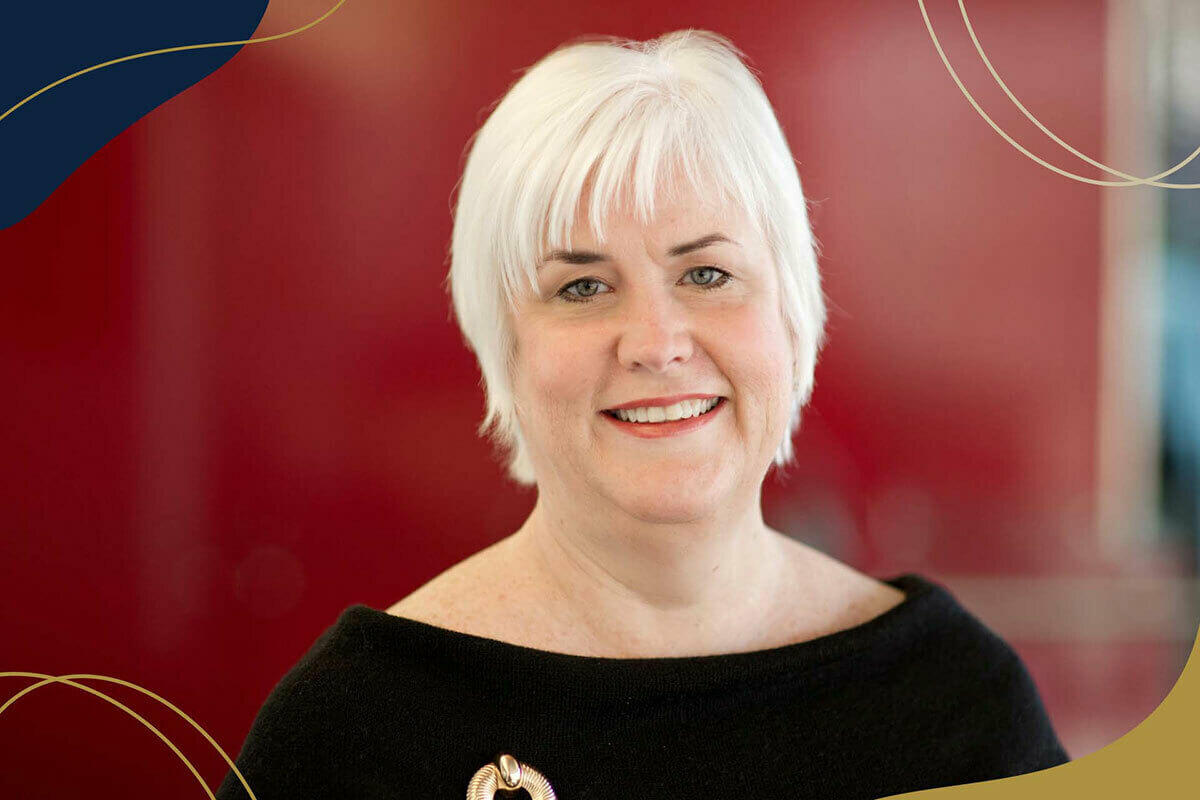
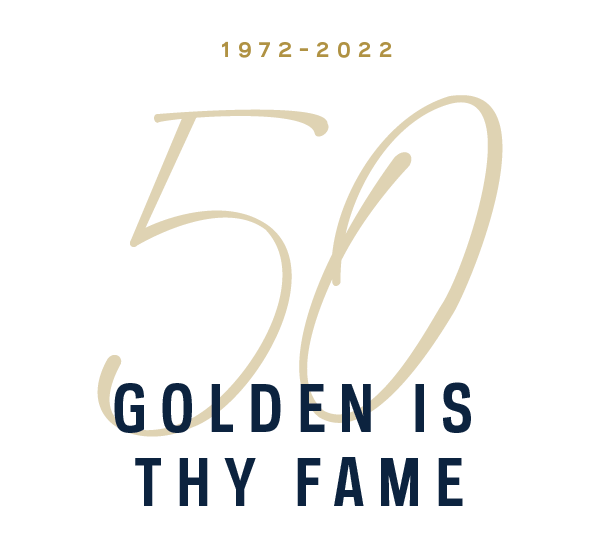
To celebrate the 50th anniversary of the co-education of women at Notre Dame, the College of Arts & Letters is publishing a series of features on alumnae who studied the arts, humanities, or social sciences, then followed a wide range of career paths after graduation. Each profile will detail how a liberal arts education helped these women discern not just what they wanted to do — but who they wanted to be.

Also in this series
• 1980s: Mary Agnes “M.A.” Laguatan, economics and French
• 1990s: Gina Pérez, Program of Liberal Studies
• 2010s: Natalie Hibshman, pre-health and psychology
Ann Combs grew up going to Fighting Irish football games with her parents and siblings in the 1960s — a time when girls had no hope of attending the all-male school.
By the time she was in high school, though, the University had begun enrolling women. And after more than a decade of tailgates, exciting games, and cheering from the bleachers, Combs knew she wanted to attend Notre Dame.
In fall 1974, she arrived as a member of the third undergraduate class that included women as first-year students.
“I was excited about the idea of following in the footsteps of pioneers,” said Combs ’78, who majored in government (now known as political science) and economics and was one of about 365 female undergraduates her first year on campus. “I’m glad I got in. I didn’t apply to a lot of other schools.”
Being the only woman in classes didn’t faze her. In fact, it prepared her for a successful 40-year career in public policy affecting retirement and health care benefits.
Combs served in the Department of Labor under three presidents, culminating in being appointed assistant secretary for employee benefits security by President George W Bush. She also worked in the private sector, helping trade associations and private companies navigate Washington, D.C.
She eventually left Washington to join the Vanguard Group — one of the world’s largest investment companies — to head retirement research and consulting, eventually leading its government affairs and corporate strategy efforts.
Throughout it all, the skills she developed and knowledge she gleaned from her Notre Dame liberal arts education served her well in her career.
“Arts and Letters was instrumental in broadening my horizons, in honing my ability to think critically, to write clearly, to communicate, and to collaborate,” Combs said. “It prepared me to take on new issues and challenges, always learning and growing personally as well as professionally.”
‘Life has challenges’
Throughout her life, Combs has not shied away from taking a path that wasn’t well-trodden.
She didn’t flinch in 1974 when a prestigious Notre Dame benefactor from her Michigan hometown told her that the biggest mistake then-Notre Dame President Rev. Theodore M. Hesburgh, C.S.C., had made was admitting women into the University.
He bet her $20 that she wouldn’t graduate.
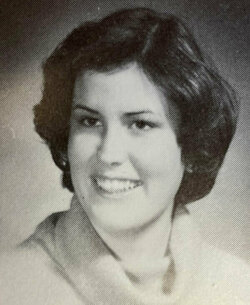
When she earned her degree, Combs reminded the alumnus — much to her mother’s horror — that he owed her $20. He didn’t pay up, Combs recalled with a laugh, but his opinion on the matter had evolved.
“Father Ted never had any doubts, and rectors and RAs provided invaluable support. Were there challenges? Yes — life has challenges,” she said. “But there was a major cultural shift at Notre Dame in a short time. They were thoughtful and caring about it.”
She experienced that shift firsthand. Hesburgh himself stayed apprised of how Combs and other female students were acclimating; he regularly visited her residence hall, where his niece also lived, to hear about their Notre Dame experiences.
“Father Ted was committed and involved,” she said. “He wanted direct feedback; he wanted his own information not filtered through anyone else.”
“Arts and Letters was instrumental in broadening my horizons, in honing my ability to think critically, to write clearly, to communicate, and to collaborate. It prepared me to take on new issues and challenges, always learning and growing personally as well as professionally.”
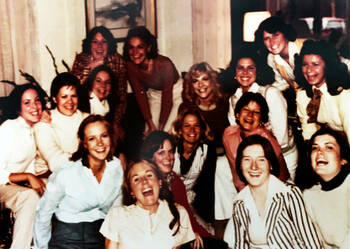
Combs called her career a series of happy accidents that began when she volunteered for then-U.S. Rep. David Stockman’s first congressional campaign in Michigan one summer — and then secured an internship in his office in Washington, D.C.
After graduation, Combs wanted to return to the nation’s capital for law school at George Washington University because she thought it would prepare her well for a career in public policy. She was right.
At GWU, Combs learned from faculty who worked in the government and she gained experience in a variety of internships, including on Capitol Hill and at the U.S. Securities and Exchange Commission.
During a summer job at the National Association of Manufacturers (NAM), Combs was tasked with analyzing new amendments to the Employee Retirement Income Security Act.
“It was complicated stuff, but the people I worked with were so passionate about the issues and so generous with their time and expertise, I knew I wanted to stay in the field,” she said. “Ensuring that workers’ retirement savings are secure and that they have access to health care — that matters. It was very rewarding."
‘I love the mission of government’
Combs’ experience in the early years of co-education at Notre Dame gave her confidence that she could handle challenges.
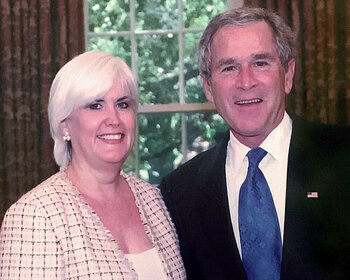
That served her well when opportunities presented themselves, including when she was fresh out of law school and working full time at NAM. The organization’s president was asked to serve on the 1981 National Commission on Social Security Reform by President Ronald Reagan and was a little taken-aback when he found out the “expert” on his staff was a 24-year-old with very little experience.
“He gave me a chance. I never worked harder in my life to prove to him his trust wasn’t misplaced,” Combs said.
That experience gave her an opportunity to watch major political figures including Daniel Patrick Moynihan, Bob Dole, and Jim Bakker in action. Leaders of Congress, organized labor, retiree advocates, and the private sector came together and fashioned a compromise that kept the system from bankruptcy.
“I got to learn from the masters of the game about how to put something together that everybody could live with,” she said. “Sadly, the art of the compromise is sorely missing in D.C. these days."
Both Republican and Democrat administrations respected her financial acumen and professionalism. She served on President Bill Clinton’s Advisory Council on Social Security, then later was appointed by President George W. Bush to run the Employee Benefits Security Administration — a position referred to as the nation’s “retirement czar.”
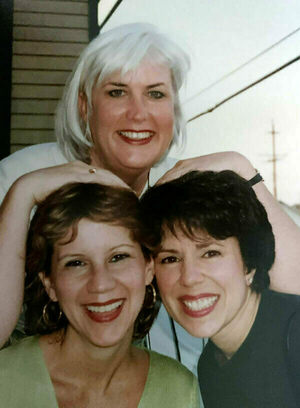
In all her roles, Combs sought to do her best by “listening, speaking up, making decisions, being of service, and finding common ground wherever possible while not compromising on core principles.”
“I’ve been very fortunate in my life to work in mission-driven environments. I loved working in government, where I had the opportunity to shape the rules that protect peoples’ savings and health care,” she said. “And I loved Vanguard — a unique financial institution that is owned by its investors and whose mission is to take a stand for all of them.”
Combs is spending her retirement at her newly built home in Granger, Indiana, and enjoys being close to family, friends, and her beloved alma mater, where she chairs the College of Arts and Letters Advisory Council.
Her time at Notre Dame, she said, set her up for life — academically, spiritually, and socially.
“Coming to Notre Dame was the best decision I ever made,” she said. “I forged the values that I carry with me to this day. My best friends are still my Notre Dame friends.”
“Coming to Notre Dame was the best decision I ever made. I forged the values that I carry with me to this day. My best friends are still my Notre Dame friends.”
Originally published by at al.nd.edu on September 08, 2022.